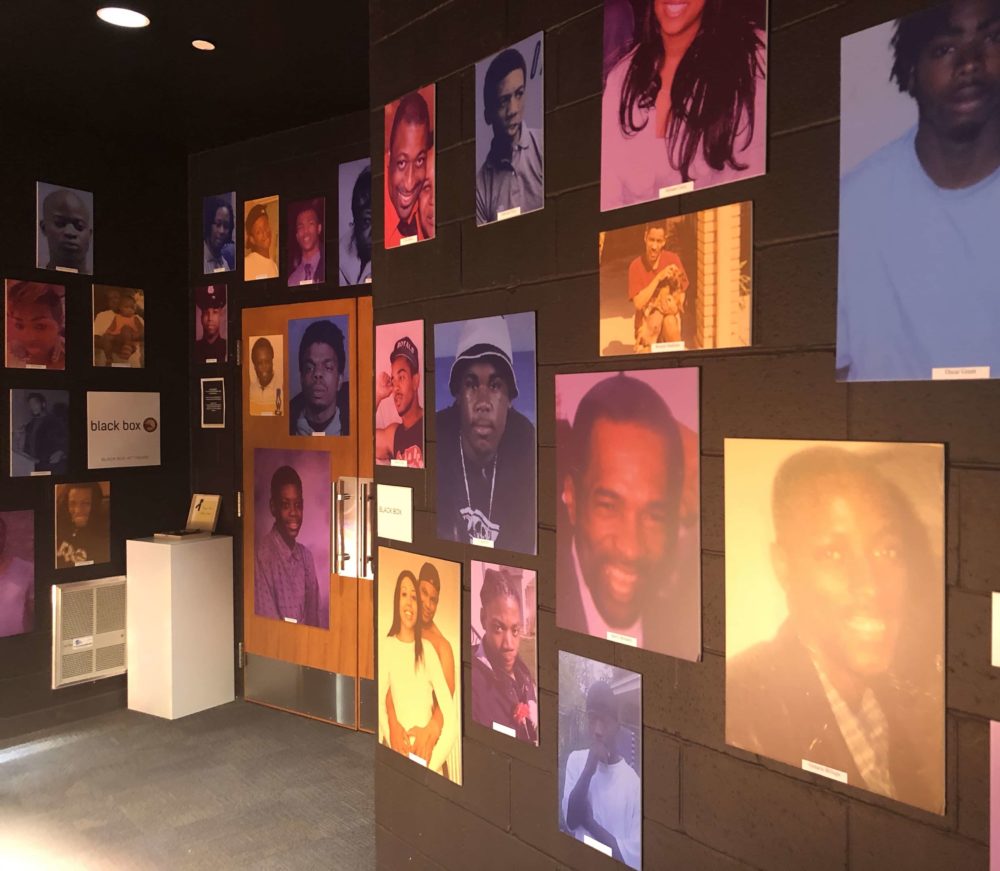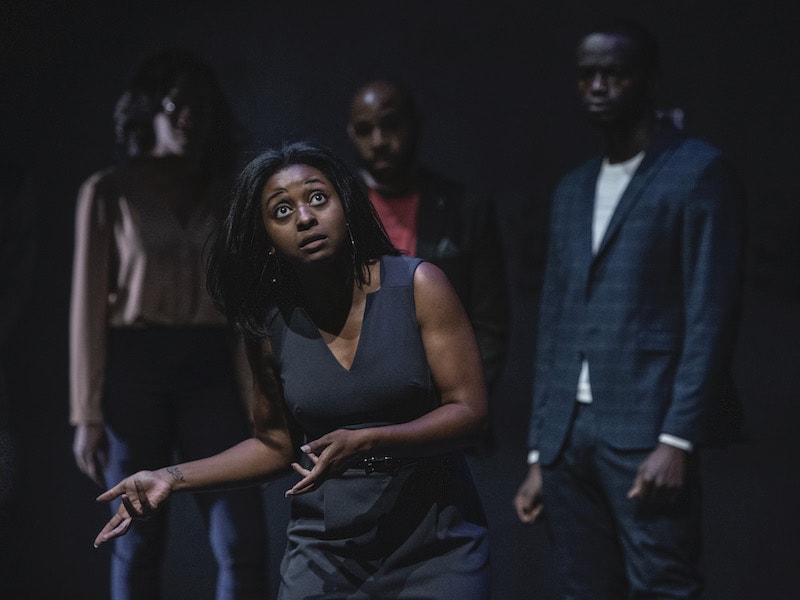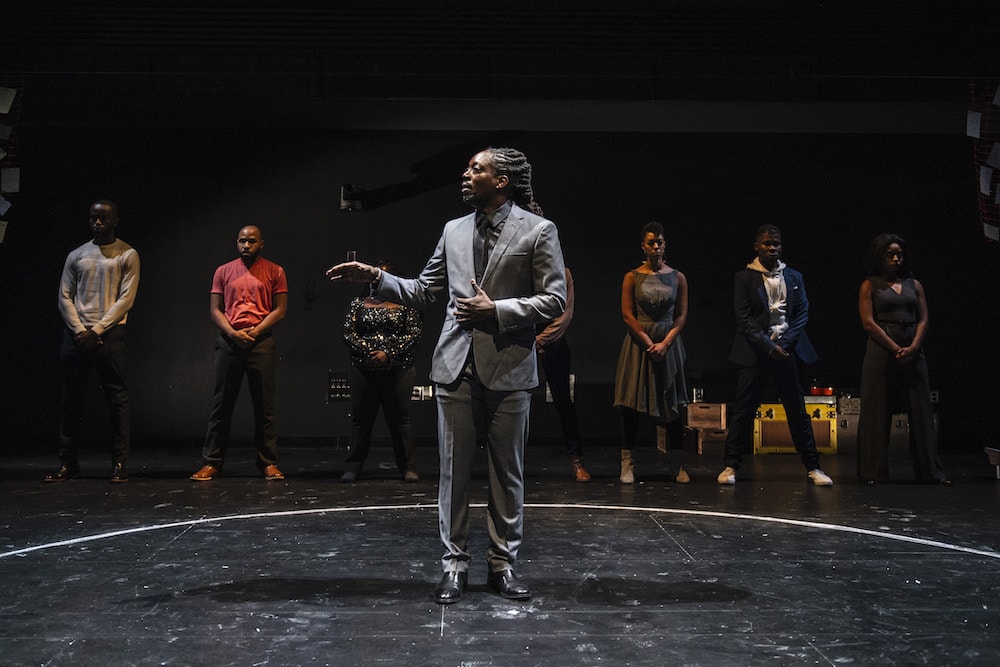Once again, anti-Black violence strikes at the heart and soul of America.
We are shocked and saddened to watch an unarmed, handcuffed Black man struggle to breathe as he lies helpless on the ground. George Floyd, Ahmaud Arbury, Breonna Taylor, Eric Garner, Michael Brown, Trayvon Martin—so many names and faces haunt our psyches as we continue to witness the sad saga of violence against Black bodies.

Theater is a creative force-field of self-expression that can raise our consciousness and give voice to messages of hope or despair as it amplifies muffled cries for social change. During this void in live theater, we more acutely feel the absence of the communal experience of theater to protest racial and social injustice.
Last October and November, DCMTA highlighted the phenomenal work of playwright Aleshea Harris’ homage to Black lives senselessly lost to racialized violence in What to Send Up When It Goes Down.
In light of current events, we thought it fitting to shine the light again on a seminal work that in the words of director Whitney White is “fierce, fast, nasty, and dangerous.”
What to Send Up When It Goes Down pays tribute to the power of theater to shape an unapologetically bold narrative for social justice.
Aleshea Harris’ ‘What to Send Up When It Goes Down’ is cathartic release against racialized violence
(originally published October 18, 2019)
Rage is scary. We don’t know what to do with rage. It’s uncomfortable and untouchable. We fear what’s inside when rage is lurking around. But in What to Send Up When It Goes Down, created by playwright Aleshea Harris, directed by Whitney White and produced by the Harlem-based The Movement Theatre Company in collaboration with Woolly Mammoth Theatre Company, collective rage in response to racialized violence in America is welcomed like a newborn baby, a treasured expression of endearment and a truth that holds the key to empowerment.

What to Send Up When It Goes Down is essentially a ritual played out through ceremony, parody, song, and dance. It is a safe public space for the full expression of the pent-up emotions experienced by Black people in reaction to the everyday insults of conscious and unconscious bias. Make no mistake about it, What to Send Up When It Goes Down is by, about and for Black folks.
But it would be helpful to read John Stoltenberg’s Magic Time in-the-moment “on tour” commentary to comprehend the full process and the radical intent of What to Send Up When It Goes Down, that will be repeated as it makes it way to four locations in the area: Duke Ellington School of the Arts, Howard University Black Box, THEARC West Black Box, and finally the Woolly Mammoth Theatre Company.
The ritual of release and healing in What to Send Up When It Goes Down is the first time I have ever been in a theatrical space that so directly confronts the deep emotions connected to racial victimization — and made it okay to completely express what you always wanted to say but couldn’t or wouldn’t. In What to Send Up When It Goes Down— you can. This feels both frightening and freeing at the same time.
What a different feeling for theater. To immerse myself as a participant in the pain, violence, injustice, fear, anger, and disbelief in which so many victims have died at the hands of people who feared them enough to want to destroy them.
For me, the experience was personal, disturbing and freeing as it brought to mind family memories of my older brother and sister growing up in East Orange, New Jersey before my time. My brother’s father was killed by the East Orange police while my brother was still in my mother’s womb. His father was unarmed and simply running-while-Black when he was shot in the back by the police for doing absolutely nothing wrong. The East Orange police acknowledged the murder of an innocent Black man and financially supported my brother and sister until they both turned 18 years of age. Too bad my family didn’t know how to work the courts and the courts of public opinion back then.

But my brother never knew his father.
This is an absurd reality in America that has morphed from public lynchings into racialized violence through police brutality and the shooting of unarmed Black people.
In What to Send Up When It Goes Down, an ensemble of eight actors lead audience participants in anguished call-and-responses, collective deep breathing, shouts, yells, and intense step-dancing aimed to shake loose the locked-up emotions of anger, rage, and the need for retaliation.
Finally, Black folks have a place to slap anti-blackness across the face; make fun of so-called white liberalism and its guilt-ridden hypocrisy that “doesn’t see color”; and look at racialized violence through the barrel of a machine gun Black people control, without being afraid of the repercussions. Who cares if you get fired from a dumb job anyway, Black folks can now walk in fearless, full swagger down gentrified streets they once controlled before they were forced to move to who-knows-where. These are some of the powerful images and messages in What to Send Up When It Goes Down.
Through a series of three parodied vignettes, What to Send Up When It Goes Down escalates in emotions that ascend to heights that honor those who have fallen victim to racialized violence, stirring up waves of fury that crest in overwhelming pain but fall upon calm shores that anchor the joy of overcoming.
A ritual is repetitive ceremony steeped in tradition and social custom. In What to Send Up When It Goes Down, a dedicated ensemble of force-field intensity and unbridled energy guides participants in a cathartic ritual in response to the horrors of anti-blackness. It’s a dance party.
At the same time, its author Aleshea Harris reminds us that, “I will always insist this piece does not, cannot solve the problem of anti-blackness nor is it an attempt to band-aid the pain of generational trauma.”
But What to Send Up When It Goes Down holds out hope for both Black and non-Black people. So, it is important for non-Black audiences to support this production by respectfully participating in the ritual. For it is only in mutual understanding that we can advance a narrative that can lead to change and healing.
You can’t really evaluate one’s personal experience. It simply is. Each will have their own emotional reaction to What to Send Up When It Goes Down. And it is all good.
The Ensemble:
Alana Raquel Bowers
Nemuna Ceesay
Rachel Christopher
Ugo Chukwu
Kambi Gathesha
Denise Manning
Javon Q. Minter
Beau Thom
Running Time: 90 minutes with no intermission.
What to Send Up When It Goes Down presented by The Movement Theatre Company was performed October 17 to 20, 2019, at the Howard University Black Box Theatre, 2445 6th St NW, Suite 1044 Washington, DC; October 24 to 27 at THEARC West Black Box, 1801 Mississippi Ave SE, Washington, DC; and October 30 to November 10 at Woolly Mammoth Theatre Company, 641 D St NW, Washington, DC.
SEE ALSO “On tour in DC with ‘What to Send Up When It Goes Down’ by Aleshea Harris”




